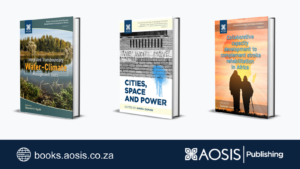Published Scholarly Work

We are proud to announce that we have added to our book collection by publishing three more open access scholarly books. We now have more than 70 titles available to be downloaded in our AOSIS Library.
The latest published titles include:
Integrated transboundary water-climate management tools
Scholarly domain: Science, Engineering and Technology
Volume editor: Nnenesi A. Kgabi
The scholarly theme of the book lends itself to the discipline of earth and atmospheric sciences, with a specific focus on water-climate studies. The book is a scholarly discourse by researchers in the natural sciences, including Hydrologists, Climate Scientists, Environmental Engineers and Water Scientists.
Download a free PDF copy here: https://bit.ly/38WGRJF
The book can be cited by its unique Digital Object Identifier (DOI), doi.org/10.4102/aosis.2020.BK205
Scholarly domain: Science, Engineering and Technology
Volume editor: Amira Osman
The scholarly purpose of this manuscript is to provide a resource for academics and researchers looking into cities, space and power in emerging economies. It also takes into consideration the relationship between emerging economies and developing contexts, as well as the lessons that may be shared between them.
Download a free PDF copy here: https://bit.ly/3eUK7Jj
The book can be cited by its unique Digital Object Identifier (DOI), doi.org/10.4102/aosis.2020.BK159
Collaborative capacity development to complement stroke rehabilitation in Africa
Scholarly domain: Health and Veterinary Sciences
Volume editor: Quinette Louw
This scholarly book focuses on stroke in Africa. Stroke is a leading cause of disability among adults of all ages, contributing significantly to health care costs related to long term implications, particularly if rehabilitation is sub-optimal. Given the burden of stroke in Africa, there is a need for a book that focuses on functioning African stroke survivors and the implications for rehabilitation within the African context.
Download a free PDF copy here: https://bit.ly/3vEZ6wU
The book can be cited by its unique Digital Object Identifier (DOI), doi.org/10.4102/aosis.2020.BK85
